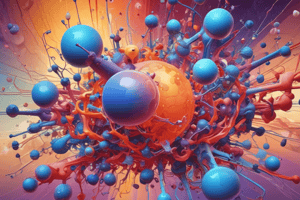Podcast
Questions and Answers
What is the primary characteristic that distinguishes a solid from a liquid?
What is the primary characteristic that distinguishes a solid from a liquid?
- Particles are chemically bonded
- Particles are widely spaced
- Particles are freely moving
- Particles are closely packed (correct)
Which of the following is an example of a compound?
Which of the following is an example of a compound?
- Oxygen
- Air
- Water (correct)
- Soil
What is the term for the process by which a solid changes directly to a gas?
What is the term for the process by which a solid changes directly to a gas?
- Sublimation (correct)
- Melting
- Condensation
- Evaporation
What is the primary difference between an element and a compound?
What is the primary difference between an element and a compound?
What is the term for the process by which a liquid changes to a solid?
What is the term for the process by which a liquid changes to a solid?
Flashcards are hidden until you start studying
Study Notes
States of Matter
- Four main states of matter:
- Solid
- Liquid
- Gas
- Plasma (high-energy state, not commonly encountered in everyday life)
- Characteristics of each state:
- Solid: fixed shape and volume, particles closely packed
- Liquid: takes shape of container, particles close but able to move past each other
- Gas: takes shape and volume of container, particles widely spaced and freely moving
Types of Matter
- Elements: simplest form of matter, cannot be broken down into simpler substances (e.g. hydrogen, oxygen, carbon)
- Compounds: composed of two or more different elements, chemically bonded together (e.g. water, salt, sugar)
- Mixtures: combination of two or more substances, not chemically bonded (e.g. air, soil, blood)
Changes of State
- Phase transitions:
- Melting: solid to liquid
- Freezing: liquid to solid
- Evaporation: liquid to gas
- Condensation: gas to liquid
- Sublimation: solid to gas (e.g. dry ice)
- Deposition: gas to solid (e.g. frost)
- Factors affecting changes of state:
- Temperature
- Pressure
- Surface area
Chemical Properties
- Reactivity: ability of a substance to undergo a chemical reaction
- Flammability: ability of a substance to catch fire
- Corrosivity: ability of a substance to wear away or destroy other materials
- Toxicity: ability of a substance to cause harm or poison living organisms
Physical Properties
- Color
- Odor
- Texture
- Density
- Solubility
- Boiling and melting points
- Viscosity
- Conductivity (heat, electricity, or sound)
Studying That Suits You
Use AI to generate personalized quizzes and flashcards to suit your learning preferences.




